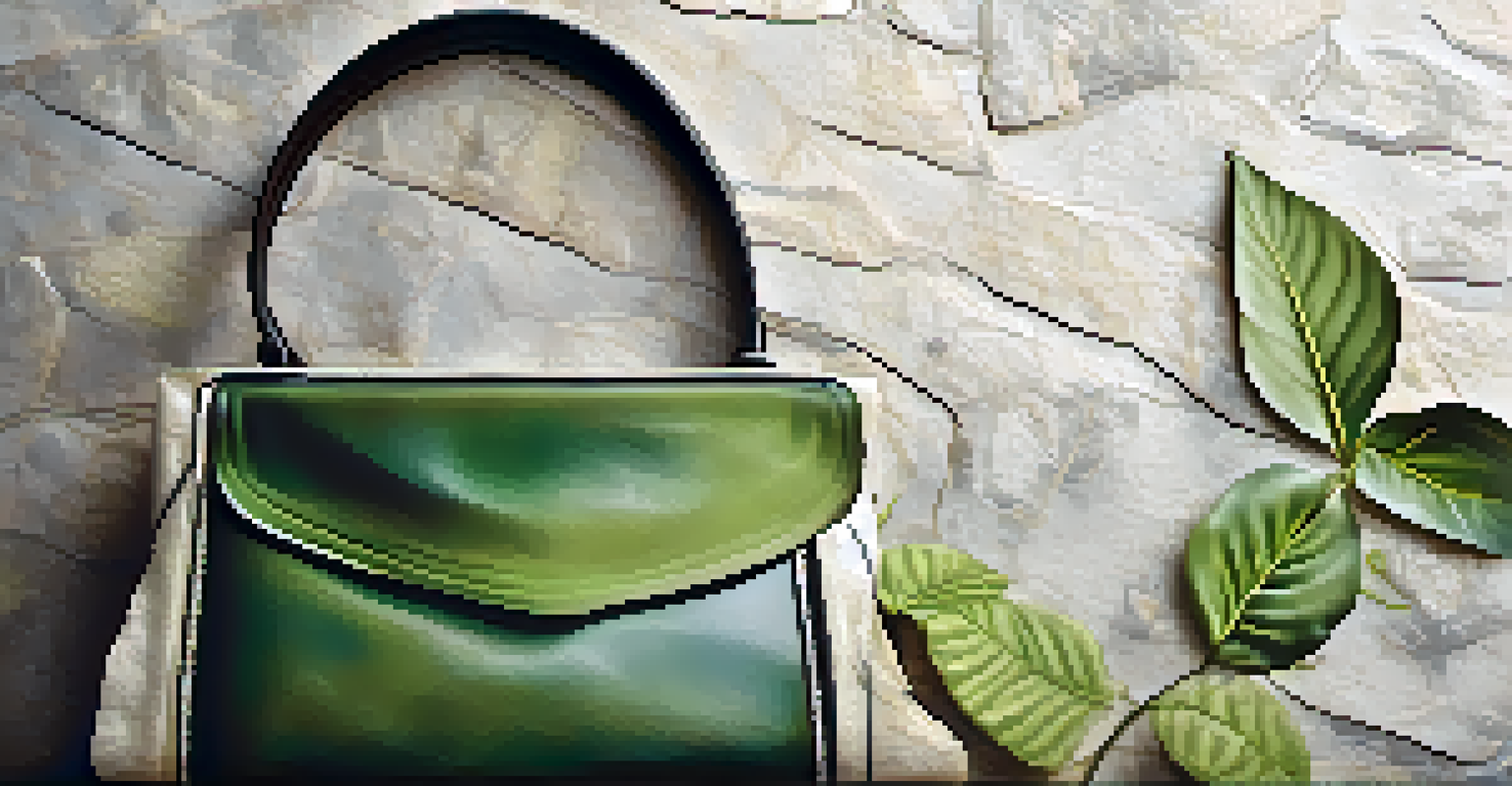The Role of Certifications in Sustainable Luxury Goods

Understanding Certifications in Luxury Goods
Certifications are third-party validations that assure consumers about the sustainability and ethical practices behind a product. In the luxury goods sector, where quality and exclusivity are paramount, these certifications provide an extra layer of trust. They can cover everything from sourcing materials to labor practices, allowing consumers to make informed choices.
Sustainability is no longer about doing less harm. It's about doing more good.
For instance, certifications like Fair Trade and Global Organic Textile Standard (GOTS) indicate that a product meets specific ethical and environmental standards. This information can be the deciding factor for customers who prioritize sustainability alongside luxury. It’s essential for brands to communicate these certifications clearly to highlight their commitment to responsible practices.
By understanding what certifications mean, consumers can navigate the luxury market more confidently. This knowledge empowers them to choose products that align not just with their style but also with their values, creating a deeper connection with the brand.
Why Sustainability Matters in Luxury Goods
The luxury goods industry has a unique opportunity to lead in sustainability, as consumers increasingly demand transparency and ethical practices. Luxury brands have historically been associated with excess, but a shift towards sustainability can redefine what luxury means. Today, luxury is not just about opulence; it’s also about responsibility and sustainability.

As consumers become more eco-conscious, they are looking for brands that reflect their values. This trend is evident in the rise of sustainable luxury brands that prioritize eco-friendly materials and ethical labor practices. By embracing sustainability, luxury brands can cultivate a loyal customer base that appreciates their commitment to the planet.
Certifications Build Consumer Trust
Third-party certifications in luxury goods assure consumers of ethical and sustainable practices, fostering trust and informed purchasing decisions.
Moreover, sustainable practices can enhance a brand's reputation and differentiate it in a competitive market. Luxury brands that prioritize sustainability can appeal to a broader audience, tapping into the growing segment of consumers who are willing to invest in products that are both beautiful and environmentally friendly.
Key Certifications to Look For
When shopping for sustainable luxury goods, it's helpful to know which certifications are reputable. Some of the most recognized certifications include the Responsible Down Standard, which ensures humane treatment of geese and ducks, and the Forest Stewardship Council (FSC), which promotes responsible forest management. Each certification serves as a beacon for consumers seeking ethically produced luxury items.
The greatest danger in times of turbulence is not the turbulence; it is to act with yesterday's logic.
Another notable certification is the Cradle to Cradle Certified™ mark, which assesses a product's safety and sustainability throughout its lifecycle. This certification encourages brands to innovate in ways that reduce waste and environmental impact. Familiarizing yourself with these certifications can significantly enhance your shopping experience.
By seeking out products with these certifications, consumers can confidently support brands that align with their values. This not only encourages companies to maintain high standards but also fosters a culture of sustainability within the luxury market.
The Impact of Certifications on Brand Image
Certifications can significantly enhance a luxury brand's image by showcasing its commitment to sustainable practices. When a brand is certified, it sends a powerful message that it values ethical considerations just as much as aesthetics. This can lead to increased consumer trust and loyalty, as customers feel good about their purchases.
For example, brands that achieve B Corporation certification demonstrate that they meet rigorous standards of social and environmental performance. This certification can elevate a brand’s status in the eyes of consumers who prioritize corporate responsibility. As a result, luxury brands that adopt these certifications can differentiate themselves in a saturated market.
Sustainability Redefines Luxury
As consumers prioritize eco-consciousness, luxury brands embracing sustainability can enhance their reputation and connect with a broader audience.
In today’s digital age, where information spreads quickly, a strong sustainability message backed by certifications can generate positive buzz. Brands that effectively communicate their certifications often enjoy enhanced visibility and can attract new customers who are passionate about sustainable living.
Challenges of Implementing Certifications
While certifications offer numerous benefits, implementing them can pose challenges for luxury brands. The certification process can be time-consuming and expensive, requiring brands to invest significant resources. Smaller luxury brands, in particular, may struggle to meet the standards set by certification bodies.
Additionally, navigating the various certification options can be overwhelming. With so many certifications available, brands must thoughtfully choose which ones align with their values and business practices. This can lead to confusion among consumers if brands do not clearly communicate the significance of their certifications.
Despite these challenges, the long-term benefits of certification often outweigh the initial hurdles. Brands that successfully implement certifications can enjoy enhanced credibility and consumer loyalty, ultimately leading to sustainable growth in the luxury market.
Consumer Education on Sustainability
Educating consumers about the importance of sustainability and certifications is crucial for fostering a more responsible luxury market. Many consumers are still unaware of how their purchasing choices impact the environment and society. Brands can play a pivotal role in this education by providing clear information about their certifications and sustainable practices.
Workshops, social media campaigns, and informative content can help raise awareness about the significance of certifications. For instance, a luxury brand could host a series of events highlighting sustainable materials or ethical sourcing practices. By engaging consumers in meaningful conversations, brands can empower them to make informed choices.
Consumer Education Drives Change
Educating consumers about sustainability and certifications empowers them to make informed choices, encouraging brands to adopt responsible practices.
As consumers become more educated, they will likely demand greater transparency from brands. This shift can encourage more luxury brands to adopt sustainable practices and certifications, creating a positive feedback loop that benefits both consumers and the planet.
The Future of Sustainable Luxury Certifications
The future of sustainable luxury goods is bright, particularly as the demand for certifications continues to grow. More brands are recognizing the importance of sustainability and are actively seeking certifications to enhance their credibility. As this trend evolves, we may see new certifications emerging that address unique challenges within the luxury sector.
Technological advancements could also streamline the certification process, making it easier for brands to obtain and maintain their certifications. Blockchain technology, for example, could provide transparent tracking of a product’s journey from source to consumer, adding another layer of trust.

Ultimately, the landscape of sustainable luxury goods will continue to change as consumers become more discerning and informed. By prioritizing certifications, luxury brands can not only meet consumer demands but also contribute to a more sustainable future.